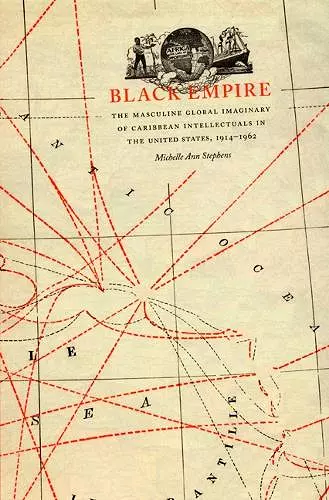Black Empire
The Masculine Global Imaginary of Caribbean Intellectuals in the United States, 1914–1962
Format:Paperback
Publisher:Duke University Press
Published:18th Jul '05
Currently unavailable, and unfortunately no date known when it will be back

Explores the writings of Marcus Garvey, Claude McKay and C.L.R. James and argues that these black transnationals articulated a novel conception of black identity that reconfigures the meaning of American nationality
In Black Empire, Michelle Ann Stephens examines the ideal of “transnational blackness” that emerged in the work of radical black intellectuals from the British West Indies in the early twentieth century. Focusing on the writings of Marcus Garvey, Claude McKay, and C. L. R. James, Stephens shows how these thinkers developed ideas of a worldwide racial movement and federated global black political community that transcended the boundaries of nation-states. Stephens highlights key geopolitical and historical events that gave rise to these writers’ intellectual investment in new modes of black political self-determination. She describes their engagement with the fate of African Americans within the burgeoning U.S. empire, their disillusionment with the potential of post–World War I international organizations such as the League of Nations to acknowledge, let alone improve, the material conditions of people of color around the world, and the inspiration they took from the Bolshevik Revolution, which offered models of revolution and community not based on nationality.
Stephens argues that the global black political consciousness she identifies was constituted by both radical and reactionary impulses. On the one hand, Garvey, McKay, and James saw freedom of movement as the basis of black transnationalism. The Caribbean archipelago—a geographic space ideally suited to the free movement of black subjects across national boundaries—became the metaphoric heart of their vision. On the other hand, these three writers were deeply influenced by the ideas of militarism, empire, and male sovereignty that shaped global political discourse in the early twentieth century. As such, their vision of transnational blackness excluded women’s political subjectivities. Drawing together insights from American, African American, Caribbean, and gender studies, Black Empire is a major contribution to ongoing conversations about nation and diaspora.
“Black Empire is a remarkable achievement, a comprehensive account of the global cognitive remapping of the Atlantic world by its travelling black subjects. This is a theoretically sophisticated and conceptually innovative study of West Indian intellectuals who confronted and shaped the geopolitical realities of the modern and modernizing world and refused to be limited by the historical terms, conditions, and discourses of national identity. Michelle Ann Stephens has produced a pathbreaking account of their response to migrancy, transnationalism, gender and empire. An invaluable book for everyone in Atlantic studies, the study of the Americas, black studies, ethnic studies and gender studies.”—Hazel V. Carby, author of Race Men
“In this strikingly original and rich study, Michelle Ann Stephens makes wonderful use of geography to remap early-twentieth-century black nationalism beyond the confines of national boundaries. With great acuity, she shows how three different radical Caribbean intellectuals imagined an international black empire that extended from the Americas to Africa and Europe. Black Empire brings a genuinely new perspective to bear on the complex interconnections of citizenship and Diaspora, gender and freedom, race and sovereignty.”—Amy Kaplan, author of The Anarchy of Empire in the Making of U.S. Culture
ISBN: 9780822335887
Dimensions: unknown
Weight: 594g
384 pages